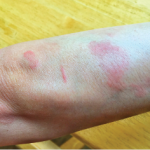Introduction & Objectives
COVID-19 is associated with nonspecific respiratory syndromes, ranging from mild upper airway symptoms to hypoxemia requiring mechanical ventilation support. An important feature of COVID-19 is the associated coagulopathy that correlates with disease severity and in-hospital mortality, without any sign of disseminated intravascular coagulopathy, in contrast to previous reports. There are increasing reports of venous thromboembolism and arterial thrombosis, irrespective of the use of pharmacologic thromboprophylaxis. Both macrothrombosis, in particular pulmonary embolism, and microthrombosis in the lungs have been largely described. Microthrombosis could be a consequence of vascular injury and the link between coagulopathy and COVID-19 severity and/or mortality.
Antiphospholipid syndrome (APS) is an acquired thrombophilia leading to the use of long-term anticoagulation therapy. Classification of APS requires the presence of one clinical event (thrombosis or pregnancy morbidity) and persistently positive laboratory test results for at least one antiphospholipid antibody (aPL), the latter including lupus anticoagulant (LAC), anticardiolipin antibody (aCL), and IgG and/or IgM anti-β2-glycoprotein I (anti-β2GPI) antibodies. Autoantibodies to phospholipids and phospholipid-binding proteins, such as antiprothrombin (anti-PT), aCL or anti-β2GPI, are involved in leukocyte and endothelial activation and induce both VTE and arterial thrombosis.
aPLs are not specific to APS but can be detected in healthy individuals and in different clinical settings, including autoimmune conditions, some drug treatments or infectious disease. The occurrence of aPLs has been largely described during viral infections, and their pathogenicity in these contexts remains controversial.
During the COVID-19 outbreak, several reports described a potential association between aPLs and thrombotic events. Previous studies exploring LAC demonstrated between 45% and 88% positivity among different cohorts in the medical ward and/or intensive care unit (ICU) settings. Only one study suggested that aPL positivity in vitro in sera of patients with COVID-19 could be prothrombotic, but LAC was not assessed.
Gendron et al. undertook this study to investigate the prevalence and prognostic value of conventional and nonconventional aPLs in patients with COVID-19.
Methods
This was a multicentric, prospective, observational study in a cohort of patients in France hospitalized with suspected COVID-19.
Results
Two hundred and forty-nine patients were hospitalized with suspected COVID-19, with the diagnosis confirmed in 154 patients. The researchers found a significant increase in lupus anticoagulant (LAC) positivity among patients with COVID-19 compared with patients without COVID-19 (60.9% vs. 23.7%; P< 0.001), although the prevalence of conventional aPLs (IgG anti-β2-glycoprotein I and IgG and IgM isotypes of anticardiolipin) and nonconventional aPLs (IgA isotypes of anti-phosphatidylserine/prothrombin and IgG and IgM isotypes of antiprothrombin) was low in both groups.

